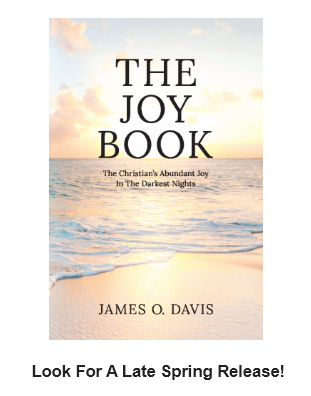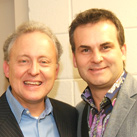Learn The Differences Between Joy & Happiness

Happiness depends on what transpires, but joy enriches the soul and comes only from the Lord. Truly, the joy of the Lord is your strength (Nehemiah 8:10).
As we begin our joy journey together, it important that we come to cognitive clarity as to what the differences are between happiness and joy. Much labor has gone into this book—not to help us to be happier but hopefully to help us to be full of joy. Learning the differences between happiness and joy can help us live a more meaningful life filled with greater purpose.
The Lord does want us to be happy and healthy, but holiness is the Lord’s higher aim for our lives. In like manner, while the Lord desires that we be happy and satisfied, joy and fulfillment are at a much deeper level. Joy can be highly gratifying in a way that is not selfish, whereas happiness is wrapped up in what makes us happy.
What is Joy?
Joy is a selfless feeling of extreme happiness and pleasure. We may have joy when we care for others, are thankful or grateful, and have deep spiritual experiences. While joy often requires great self-sacrifice, we will find lasting inward contentment and peace. Furthermore, this feeling may not be about ourselves but about helping others become more content.
True joy cannot be achieved without Christ in our lives. In the Book of Philippines, the Apostle Paul uses the words “rejoice” or “joyful” 16 times in 104 verses. He was not giving pep talks on joy to indicate that a person could work joy up in their lives. In every instance, rejoicing or joyfulness was connected to Christ.
Whenever we are at our lowest point, we should turn to Christ in order to be filled with joy. When we feel alone and as if no one is on our side, we can turn to prayer to help us through any problems we face. When we find our spiritual equilibrium, we also find joy deep in our soul that is almost unbelievable and indescribable.
Differences Between Joy & Happiness
When we imagine what joy and happiness are, we might not perceive any clear distinctions at first. However, after thinking more deeply about it, we will likely come to the conclusion that the two words are exceptionally unique from each other.
Constant: Joy is constant while happiness is temporary.
For example, having a baby can make a person joyous—a feeling can last forever. While winning a new car will definitely make us happy, the feeling is temporary because it will eventually become only a memory. The Joy Book will assist in understanding how the Apostle Paul gained the joy that renewed him—even in prison. When we have joy, we will not find ourselves chasing rainbows of happiness.
Compassion: Joy is about selflessness while happiness involves pleasing self.
Being selfless can mean ignoring our own feelings in order to benefit someone else. Although this can be a challenge, we can gain joy, meaning, and purpose from it. For example, joyous feelings may arise when we care for someone we love when they need us the most.
Paul illustrated selflessness through Epaphroditus who risked his life for the sake of the gospel and for the Philippians. He told them to honor such a man. Paul also taught us that his joy was complete through his relationship with the Philippians.
Happiness can be fun but definitely not as meaningful because it is only about pleasing ourselves. If we go out to eat at a particular restaurant, it could make us happy but would not necessarily be a particularly fulfilling activity. However, if we cook a meal to take to someone who is less fortunate or is experiencing illness, we will find a joyful fulfillment.
Commitment: Joy is deeply spiritual while happiness lacks depth.
Then he said to them, “Go, eat of the fat, drink of the sweet, and send portions to him who has nothing prepared; for this day is holy to our Lord. Do not be grieved, for the joy of the Lord is your strength” (Nehemiah 8:10).
The joy of the Lord is found on the road to restoration. God convicts us of sin, and our first reaction is often guilt and shame. Ezra the scribe gathered all the people and read to them from the book of the law, and the Levites explained the law. They read from the book, from the law of God, translating to give the sense so that they understood the reading (Nehemiah 8:8).
The original Hebrew word for “joy” in Nehemiah 8:10 means gladness. The root word of strength means “to be strong, prevail; to make firm, strengthen.” The joy of the Lord is a constant gladness and cause to rejoice. It stems from an inner strengthening from our relationship with Him.
Circumspect: Joy is meaningful while happiness feels good.
Since joyful experiences are deep, they can also be meaningful and memorable. For instance, we would likely always remember holding our child’s hand for the first time or hearing our spouse laugh. While buying new clothes can feel good at the moment, they are only material objects. However, joy is wrapped up in Jesus Christ, family, people, and close colleagues. God never does His deepest work in the shallowest parts of our lives.
Choice: Joy is a choice a person makes while others chase after happiness.
When we are immature, we often think we want certain things to make us happy; but we do not understand the consequences. When people get what they want, they often find they do not actually want it.
For example, a man might chase after a woman because she is attractive and makes him smile and laugh. However, this can be a problem because the man is immature and only sees the woman’s appearance and personality. The relationship may not endure because it started out for the wrong reasons. Additionally, no one should have to chase after someone to make them love them. With maturity, a man or woman can consciously choose a partner with whom they share a genuinely mutual connection that can become a truly joyful experience.
When Paul was in prison, he could not redecorate the inside of the prison, but he could redecorate the inside of his life with joy! He chose to have joy in his heart, even though his physical surroundings were hurtful and painful. Instead of chasing happiness, he learned the secret of choosing joy.
 Challenges: Joy involves trials and hardships while happiness is easier to achieve.
Challenges: Joy involves trials and hardships while happiness is easier to achieve.
Taking care of a baby involves plenty of joy but also hard work, dedication, and selflessness. Alternatively, we can make things easier on ourselves by working less and settling for happiness. This means we can be happy by eating an ice cream cone. It is inexpensive and tasty, but we probably will not get much else out of it.
Joy is a selfless feeling of extreme happiness and pleasure. When we work hard, we have better experiences (volunteering, a purposeful career, etc.) that bring joy while happy experiences such as carnival rides and dressing in trendy clothes can become completely meaningless. In other words, happiness can come and go; but true joy can go with us throughout the entirety of our lives.
When my wife, Sheri, and I buried two children in 1991 and 1998, we had found joy in our relationship with Christ, even though to this day, we never fully understood why we had to experience such loss early in marriage. Even though happiness can be trite, joy is a truth!
Constructive: Joy is transformative while happiness can hold us back.
Joyful experiences like marrying, having a family, and sharing a deep Christian life (such as praying together every day, attending church services regularly, etc.) give new depth to life.
Alternatively, happy experiences are not as intense or worthwhile and will likely not provoke any profound feelings that are life-changing. For example, riding in a limousine could make us happy, but the feeling will wear off with nothing left to show but wasted time; and wasting time on meaningless activities holds us back from making personal progress.
Obviously, there is nothing wrong with having fun with friends; but to add value to people’s lives, there must be a sense of joy and personal fulfillment.
During the twilight months of the late Dr. Bill Bright’s life, who was the Founder of Campus Crusade, every time without exception, when I asked how he was doing, he would say, “I am rejoicing!” On the outside, he was dying of pulmonary fibrosis but on the inside, he was being transformed daily into more of the image of Christ. His joy was contagious.
Connect: Joy connects people to each other while happiness consists of momentary connections.
Getting married and having a family whom we love and focus on in a positive way can bring joy into our life and help us make meaningful connections that will last a lifetime, such as a best friend who loves us for who we are and does not try to change us.
An example of a happy connection can be making friends in college with people who share our interests at the moment. We go to college football games; and while we are together, there is great laughter, excitement, and cheering. These experiences and others like them build great memories and can cause reflection over those moments for years to come.
However, joy that comes from Christ and our relationship with Him as well as with other committed Christians will have a much deeper impact on our souls. One of the greatest examples of this is Paul and Silas in the Ephesian jail. At midnight, Paul and Silas began to sing because of the joy of the Lord in their lives. Their relationship to each other was wrapped up in their joy in Christ and they lived emotionally and spiritually above the trials and tests of life.
Costly: Joy is a less common satisfying feeling than happiness is.
One reason joy occurs less often is because it takes a great deal of maturity, selflessness, and effort. Since happiness is easier to achieve, it follows that we can be happy more frequently than joyful.
Even though there is no doubt there is a level of true joy in the world, the greatest joy comes from our relationship with Christ and when we are in sync with Him. Christian joy is far less common and contains stronger feelings than happiness.
There is a price to pay to experience the Christian’s abundant joy in the darkest days. The pure aroma of joy is brewed in our quiet time in prayer and Bible study. It is poured into our lives in through the Person of the Holy Spirit and shared with others through our experiences, conversations and lifestyle.
Communicate: Joy is difficult to define while happiness is easy to describe.
The intensity associated with joyous experiences can make it difficult to describe. In fact, we would likely have to actually experience joy in order to truly understand how it feels. Apart from this, happy experiences are not nearly as deep; and most of us, if not all, have experienced them at one time or another. This can make them quite simple to describe.
Though you have not seen Him, you love Him, and though you do not see Him now, but believe in Him, you greatly rejoice with joy inexpressible and full of glory (1 Peter 1:8). According to Peter, this joy is not based on what we have seen but comes from Christ in such a manner that is inexpressible and glorious. This is rare indeed!
Consistent: Joy can exist in the midst of difficulties while happiness cannot live in this reality.
We can feel so intensely alone and empty that it makes it impossible to be happy, but having solid Christian beliefs at this time can make us profoundly joyful. Even though happiness is gone, joy can still be present in Christ.
Weeping may last for the night, but a shout of joy comes in the morning (Psalm 30:5). Just as the sun rises out of the darkness, joy rises in our hearts! Money, fame, or health cannot bring us this kind of joy.
Notice the Psalmist said at times there is weeping. I know over the years, there have been many tears shed in my walk of faith. Also, we read, “may last for the night.” In other words, there can be a timeframe or season for the weeping or the sadness in our lives. I am not sure how long your night may be, but every man and woman of God, at some point, has walked through the midnight hour of the soul.
However, just as the sunsets, it will surely rise again. We read, “a shout of joy comes in the morning.” Just like a geyser, bursting from beneath, joy breaks forth from within in a shout. As to “in the morning,” I believe our “in the morning,” is whenever our breakthrough takes place. Christians are like corks. Life can push them down, but they will come back to the top!
How To Find True Joy
 Since finding our true joy can give us a better life, we should walk this path each day. The Joy Book: The Christian’s Abundant Joy in the Darkest Days will teach us how to discover this joy, develop this joy, and deploy this joy in our lives.
Since finding our true joy can give us a better life, we should walk this path each day. The Joy Book: The Christian’s Abundant Joy in the Darkest Days will teach us how to discover this joy, develop this joy, and deploy this joy in our lives.
As you read through this book, highlight every meaningful sentence and consider keeping a journal. Writing down your thoughts can be helpful in piecing them together and clarifying them. Committing to writing every day can give you an opportunity to see how your thoughts and feelings change over time.
Once you have figured out the personal applications to discovering joy, you can work towards developing or incorporating those things into your life. You can figure out ways to put away the things that do not contribute to your future. These could be bad habits or even negative people who prevent you from obtaining pure joy. Strive to be authentic with yourself and others. With this mind, you will be able to focus on understanding yourself and your wants and needs on a deeper level.
As you read through this book, deploy the truths you have learned with friends and into various circumstances in your life. The more you discuss things with others, the clearer they become and the better the applications.
Comparing joy versus happiness can change your life for the better and give you the chance to be better informed in order to create the future you truly want. If joy is what you want and I hope it is, then, make this a personal goal and write down the steps to achieve it.
Back To Blog




